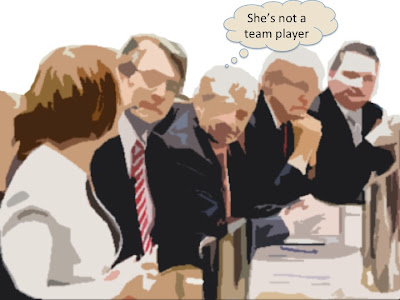In this series of posts, I'm discussing introverts, and to kick off the series I described a hypothetical situation in which a young scientist, Jennifer, is being pressured by her supervisor to be more verbal and a "team player". He further chastises her for keeping her ideas to herself and not sharing her thoughts with other coworkers. Jennifer is shocked because she's naturally a quiet, cautious person who likes to develop her ideas before presenting them to others. Unlike her coworkers who "think out loud", Jennifer prefers to work out her thoughts in private and then, when she's ready, she shares them with others.
So let's analyze the situation in light of the foregoing posts describing the differences between extroverts and introverts and the modern idealization of extroversion as the preferred model of behavior in the workplace.
Jennifer's supervisor says to her, "You're doing really good work, but I'm wondering when you are going to come out of your shell. We need people who are good team players and actively participate in staff meetings and share ideas with everyone."
First of all, we see that this supervisor is using specific language to describe Jennifer's behavior: "come out of your shell" and "team player". Snails and turtles have shells in which they hide from predators. The snail analogy applied to human behavior implies that such people are hiding from the world. Jennifer's boss is characterizing her as a person who is hiding inside a shell, which implies that she is maladjusted, deficient in social skills, or is unwilling to communicate. The "team player" reference is one of those overused sports analogies, which became popular in the business world (and later adopted by other professions). By accusing someone of not being "a team player", you are saying that that person is not supporting the team goals.
One problem with these analogies is that they characterize people in black and white terms; in other words, stereotypes. Such black and white terms are inappropriate, insulting, and often untrue. In the modern business world, the worst criticism one can level at someone is not that they are incompetent, but that they are not a "team player". The charge of not being a "team player" is particularly effective when leveled at women who are traditionally not participants in team sports (or at men who are not as athletic or as aggressive as other males in the office). Jennifer's not playing well with others. Bill's not sharing his toys. She's more interested in herself than in others. He's not helping the team. Such characterizations serve to further isolate people who are different from the larger group.
The other problem is that such terms reflect a bias towards extroverts--that any other behavior is wrong or counterproductive. The implication is that solitary work and the skills associated with it are not only not of value, they are suspect. In fact, there is nothing inherently wrong with solitary work. Nor is there any evidence that teamwork can lead to a superior outcome. Clearly, some problems require intense concentration and solitary contemplation to find a solution. Even team members working on a joint project must often carry out some tasks separately.
So how did Jennifer respond to these charges? She said, "I'm not hiding...I'm just quiet and like to work things out by myself. When I'm sure I've got a good idea and some preliminary plans, then I share my thoughts with others."
If you've read my previous posts on how to counter a verbal attack, you will have some inkling as to what was wrong with Jennifer's reply and how she should have responded. The supervisor's statements were verbal attacks. Verbal attacks contain two components: the bait and the presupposition. The bait is the obvious attack, which usually involves a charge of some kind. In this case, the bait is the charge that Jennifer is hiding in her shell and is also not a team player. The presupposition is the unspoken charge, but is the real attack. Jennifer fell for the bait and responded to it. When the victim goes for the bait, it opens the door for further attacks:
Her supervisor looks askance and replies, "I'm not a big fan of the lone wolf style of working. People get suspicious when someone keeps all their thoughts to themselves."
What should Jennifer have done? As I described previously, the only way to handle a verbal attack is to ignore the bait and address only the presupposition. In the next post, I'll describe what the presupposition was in this verbal attack and how Jennifer could have responded.

No comments:
Post a Comment